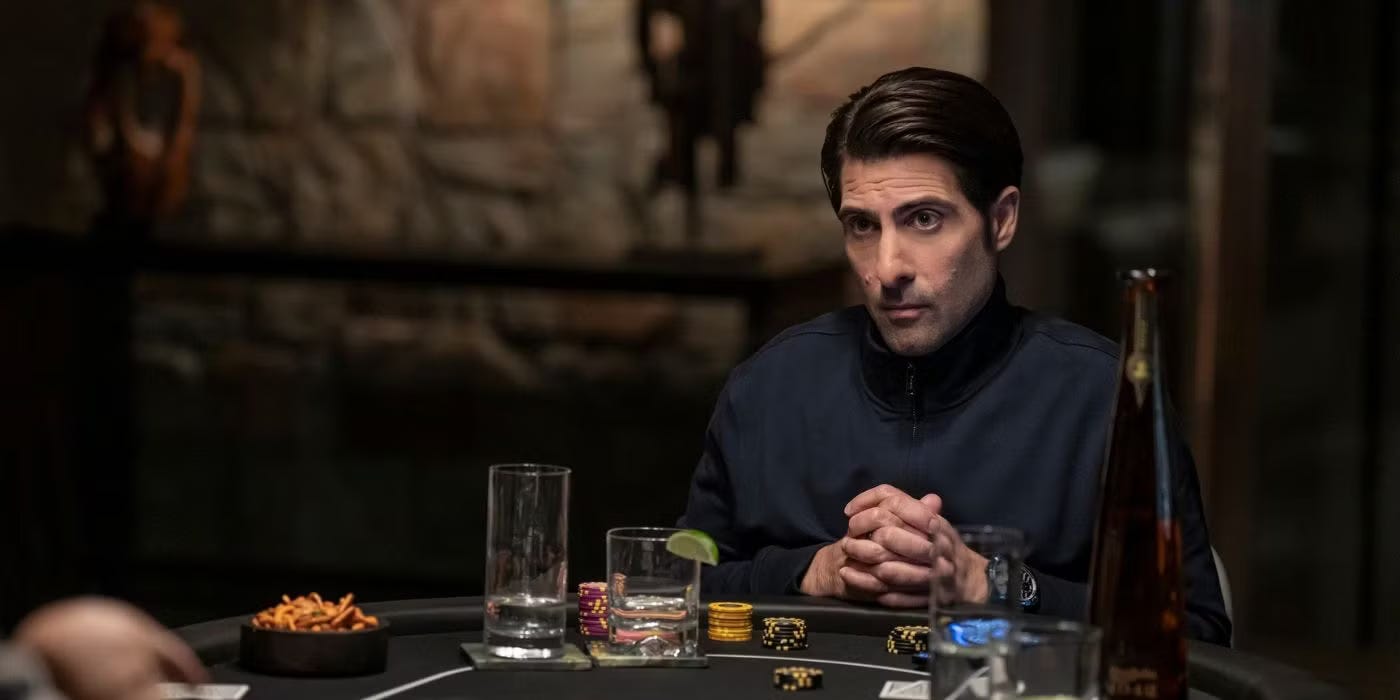Mountainhead reads the tech bro tea leaves
Jesse Armstrong made a movie that explains our constant political chaos
This post contains spoilers for Mountainhead that I hope won’t become spoilers for life.
People ask me a lot what I think will happen to the United States; if we’ll stay a democracy (some say we’re already not), descend into civil war or martial law, or maybe just keep hovering amidst this nebulous blend of the dysfunction to which we’ve all become accustomed, and clear-cut authoritarian practices?
I’m usually reluctant to share my forecast because it’s depressing at best, and hopefully wrong. On a few occasions I’ve given three potential scenarios (roughly: a slow and worsening trend of the US becoming a competitive autocracy that doesn’t reverse in our lifetimes; a severe descent into clear autocracy followed by a democratic recovery like post-war Germany; or a tech-driven transnational shift that overhauls entire nations, alliances, and economies). I especially don’t like to explain the third scenario, even though it’s not baseless, because I’m aware it sounds crazy. Not a great vibe for casual conversation. But now I can just tell people to watch Mountainhead.

You know how people say Veep was a documentary? As a close observer of the tech/crypto/manosphere/broligarchy and its influence on our government, that’s how I felt watching Mountainhead.
This wasn’t accidental, as Jesse Armstrong pitched the movie in December 20241 and rushed to get it made so it would feel “fresh in the breakneck news cycle.” I take that to mean he wanted to release it before the plot points manifested in real life, as he told Charlie Warzel, “the trick is finding a comfortable distance from what’s happening in reality.”
[It was wise of Armstrong to rush. Just two days before Steve Carrell’s Randall uttered “you’re always going to get a few people dead” as justification to not scale back an AI feature responsible for worldwide violence, Senator Joni Ernst responded when confronted at a town hall about deaths from proposed Medicaid cuts, that “we are all going to die.”]
We meet our four technonarcissists for a poker weekend at the Utah mega-lodge Mountainhead, just built by their poorest friend Hugo Van Yalk (played by Jason Schwartzman and seemingly based on venture capitalist Marc Andreessen). A mere centimillionaire (net worth $521M) who they call Souper, short for soup kitchen, Hugo-Soup is the Wormwood who would do anything to become a billionaire or even just get a smidge of approval.
Hugo-Soup has room-cucked himself for the weekend so the richest man in the world, Venis Parish (played by Cory Michael Smith as a Musk/Zuck/SBF combo), can sleep in the primary suite. This is fitting because he’s currently the one primarily responsible for worldwide violence. Poker weekend coincides with the launch of a new AI feature on his app Traam (“like 4chan on fuckin' acid”) that lets users create deepfakes so real-seeming that they’re causing humanitarian crises and economic collapse all over the world. The group is confronted with these developments thanks to Jeff (played by Ramy Youssef, seemingly inspired by Sam Altman) who reads out fresh headlines describing the worst day of millions of peoples’ lives.
But not their lives. Guided by pseudo-intellectual musings about “the Great Turning”2 from the elder Randall-Carrell, it takes about 30 minutes for the crew to start tossing around plans for “couping out” various countries and dividing the continents amongst themselves. “Should we go Argentina, Paraguay, Chile…or do we go Haiti, Cuba, Panama, Mexico?” Their long game involves combining their tech in a quest to achieve transhumanism by uploading consciousness to the cloud. How their apps would practically achieve this, separately or together, is unclear beyond vague references to ‘data’ and ‘compute’, but they cite a time horizon of five years reminiscent of how Donald Trump throws out two weeks.
If it all seems deranged, I’m sorry to report that this is wholly aligned with the dystopian worldview held by Peter Thiel, founder of PayPal and Palantir, as well as an early investor in Facebook and JD Vance, and the clear inspiration for Carrell’s character. The way these men think, speak, and justify their careless atrocities was not invented by Jesse Armstrong, but is a real (and alarmingly popular!) ideology known as technofeudalism, credited to a guy named Curtis Yarvin. The NYT interviewed Yarvin in January, which I recommend for a full understanding of how relevant his ideas have become and what he has in mind for us peons, but to sum it up:
Institutions at the heart of American intellectual life, like the mainstream media and academia, have been overrun by progressive groupthink and need to be dissolved. He believes that government bureaucracy should be radically gutted, and perhaps most provocative, he argues that American democracy should be replaced by what he calls a “monarchy” run by what he has called a “C.E.O.” — basically his friendlier term for a dictator.
While Yarvin himself may still be obscure, his ideas are not. Vice President-elect JD Vance has alluded to Yarvin’s notions of forcibly ridding American institutions of so-called wokeism. The incoming State Department official Michael Anton has spoken with Yarvin about how an “American Caesar” might be installed into power. And Yarvin also has fans in the powerful, and increasingly political, ranks of Silicon Valley. Marc Andreessen, the venture capitalist turned informal adviser to President-elect Donald Trump, has approvingly cited Yarvin’s anti-democratic thinking. And Peter Thiel, a conservative megadonor who invested in a tech start-up of Yarvin’s, has called him a “powerful” historian. Perhaps unsurprising given all this, Yarvin has become a fixture of the right-wing media universe: He has been a guest on the shows of Tucker Carlson and Charlie Kirk, among others.
He’s never explicitly discussed in the movie, but without Curtis Yarvin and his disciple Peter Thiel, there would be no source material to satirically skewer. It’s as much about embodying a certain intellectual affectation3 as it is an aspiration to global dominance. If you’ve found yourself baffled by some recent political developments where America’s leadership has taken actions that seem squarely opposed to Americans’ interests, at least from the perspective of history, science, economics, and constitutional principles, Mountainhead might be able to clear up some confusion.

I’ve felt a little insane (it’s a theme) when trying to articulate why Donald Trump and his orbit don’t care about America’s interests as we’ve always thought of them, like why they don’t care about whether the financial system holds up or whether the dollar holds its value beyond the next election cycle. It might be easier to digest when the fictional Carrell-Thiel proposes that “Bretton Woods crumbles, the fiat currencies wane, the blockchain prevails… are we the Bolsheviks of a new techno world order that starts tonight?” However, it’s much more alarming once you realize this fictional broligarch is ideologically modeled on a very real individual who really thinks this way and has the ear of the two people running the world’s largest economy and military.

After the fictional US president requests a phone call to discuss moderating Traam, Ven says the president is “just a dude, a fucking arrangement of carbon.” When POTUS was unsatisfied with Ven’s decision not to moderate the deepfakes, Carrell-Thiel feels indirectly chastised by the leader of the free world. Unable to withstand critique, Carrell-Thiel calls the president a simpleton (same of his doctor who dared suggest his cancer is not currently curable), and then boasts that he’s equipped to coup out the entire United States, not just some minor South American countries. “The great thing about me is I know everyone and I can do anything,” he brags while attempting to boil a “simple hen’s egg mit salz,” but does so sans eau.
Tiny comeuppances like this were satisfying releases to the mounting tension, revealing the profound inner smallness obscured by the outsize scale of their power. The odds are heavily in the group’s favor, but they’re destined to become undone by their individual selfishness and hubris. These are indeed the forces that prevent the broligarchs from successfully couping the entire world (or at least Argentina). Their latest overvalued unicorn idea doesn’t survive the weekend.
With every other human and sovereign nation rendered irrelevant in their minds, the quartet implodes under its own nuclear-grade sociopathy. While the world descends into sectarian violence thanks to Ven’s continued refusal to moderate Traam, Jeff muses that he’s “sitting on the cure for info-cancer while everybody dies, it’s…weird.” Sure, Jeff could agree to receive billions for selling Ven his AI technology, which is capable of identifying deepfakes, but instead he just bemoans the tragedy and pretends he isn’t psyched to watch his net worth surpass Carrell-Thiel’s, as his company’s stock spikes as a direct result of the Traam chaos.
Jeff’s character is coded as the only one who gives the slightest shit about humanity, or at least the only one who seeks anything that resembles an emotional connection with another person. Too bad his idea of connection is quite off base. His girlfriend is in Mexico for the weekend (at a sex party she says is not a sex party), and he obsesses over her whereabouts before deciding to have her followed…subtly, from far away. Jeff also has genuine affection for Carrell-Thiel as a mentor and all three of them as friends, but it’s ultimately clear that he’s just as sick as the others, as much as he might get off on being the group’s superego. He’s still in the room with them, living by the same bullshit First Principles that his friends use to justify burning him alive in a sauna, the consequence of naively confiding in Carrell-Thiel that he won’t sell his AI to Ven.
Don’t worry, he survives, but his reaction to the ordeal really drives the point home: “I love you guys, that’s why I think you trying to kill me is particularly difficult to get over.”

Jeff’s survival comes at the cost of agreeing to sell his AI to Ven, a deal brokered by a team of white-collar executors who show up at Mountainhead in the middle of the night. Jeff was locked in the gasoline-slicked sauna until after the deal is signed.
In the bright light of morning, with Jeff’s AI now moderating Traam’s inflammatory deepfakes, global tensions appear to be cooling and Soup’s dreams of becoming a South American dictator are dashed, but the deal has finally made him a real life billionaire. You could almost forget the rest of the world exists to be saved, irrelevant as it was to the true driving force behind the resolution.
Unbeknownst to the others, Carrell-Thiel’s doctor gave him a prognosis of 5-15 years. They’re all accelerationists, and Ven claims that if he buys Jeff’s AI, they can achieve transhumanism in five years rather than a “glitchy 10” and thus keep Carrell-Thiel’s consciousness alive forever. Ven promises to make Carrell-Thiel the first brain on the grid, without necessarily realizing why he’s in such a rush. But at the end of the day, it wasn't a passion for transhumanism or compassion for humanity that forced the business deal that calmed worldwide anarchy, but Carrell-Thiel’s deep dark fear of his own human mortality.

Like the broligarchs currently in the global driver’s seat in real life, these men are all so dehumanized and dehumanizing that they’d rather foist their megalomaniacal fantasies upon the entire world than have one less dollar or feel any sense of primal human vulnerability. They have literally everything a human could ever want or need, but they’ve completely repressed their own humanity, so they can’t even enjoy a poker weekend without it devolving into a malign mission to destroy civilization.
Mountainhead is funny because it’s true. I just hope people realize it’s not a joke.
Have you watched Mountainhead yet? Let me know what you thought in the comments…
I’d love to know what Jesse Armstrong was thinking when Silicon Valley showed up at the inauguration the next month.
One of Steve Bannon’s pet ideologies. Even though there’s something of a divide between Bannon and the tech bros around transhumanism, they agree on the idea of a Fourth Turning. Not relevant to the movie, but will likely become relevant IRL.
Listen to the All In podcast for reference.










When you further dissect how the apocalyptic Christian fundamentalist movement driving socio-political shifts like Project 2025 and MAGA stem from a theologian who was directly funded by a couple of Gilded Age steel and banking barons in order to create a theology that would suppress labor movements, the ways that disparate apocalyptic groups are being leveraged in favor of billionaire grifts and Fourth Turning visions really comes into stark relief.